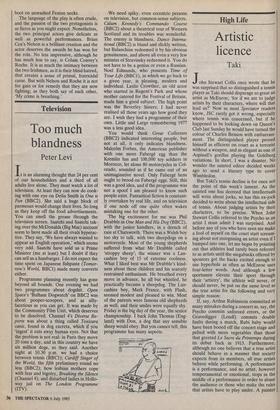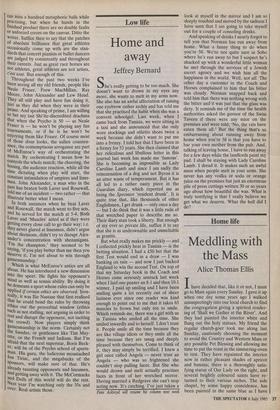High Life
Artistic licence
Taki
John Stewart Collis once wrote that he was surprised that so distinguished a tennis player as Taki should disparage so great an artist as McEnroe; 'for if we are to judge artists by their characters, where will that lead us?' Now as most Spectator readers know, JSC rarely got it wrong, especially where tennis was concerned, but if he happened to be looking down on Queen's Club last Sunday he would have turned the colour of Charles Benson with embarrass- ment. The distinguished player proved himself as efficient on court as a terrorist without a weapon, and as elegant as one of Aspinall's gorillas playing the Goldberg variations. In short, I was a disaster. No wonder the sainted editor decided weeks ago to send a literary type to cover Wimbledon.
But Taki's tennis decline is for once not the point of this week's lament. As the sainted one has decreed that intellectuals will write about jocks, so has this ex-jock decided to write about the intellectual side of tennis. About judging artists by their characters, to be precise. When John Stewart Collis referred to the Psycho as an artist I must admit I was surprised. And before any of you who have seen me make a fool of myself on the court start scream- ing about not recognising an artist even if I bumped into one, let me begin by pointing out that athletes had rarely been referred to as artists until the megabucks offered by sponsors got the hacks excited enough to use hyperbole as often as McEnroe uses four-letter words. And although a few sportsmen elevate their sport through their 'artistry', the athlete will never, or should never, be put on the same level as the true artist for the following and very simple reason: If, say, Arthur Rubinstein committed as many mistakes during a concert as, say, the Psycho commits unforced errors, or the Gravedigger (Lendl) commits double faults during a match, Rubi baby would have been booed off the concert stage and pelted with more vegetables than those that greeted Le Sacre du Printemps during its debut back in 1913. Furthermore, although no one believes that a true artist should behave in a manner that society expects from its members, all true artists behave while performing. A performance is a performance, and no artist, however temperamental or emotional, stops in the middle of a performance in order to abuse the audience or those who make the rules that artists have to play under. A painter can miss a hundred metaphoric balls while Practising, but when he hands in the finished product there are no double faults Or unforced errors on the canvas. Ditto the writer. Suffice then to say that the patches Of absolute brilliance that great athletes occasionall- y come up with are the stan- dards that concert pianists or ballet dancers are judged by consistently and throughout their careers. Just as great race horses are not athletes, great athletes are not artists, C err tout. But enough of this. Throughout the past two weeks I've been seeing all my old friends, people like Neale Fraser, Frew MacMillan, Ray Moore, John Alexander and Lew Hoad. They all still play and have fun doing it, Just as they did when they were in their Prime. And speaking of prime, I am willing to bet my last Shi'ite-discredited drachma that when the Psycho is 50 — as Neale Fraser is — he won't be playing any fun tournaments, or if he is he won't be enjoying them like Fraser. Of course most Of those dour looks, the sullen counten- ance, the contemptuous arrogance are part of McEnroe's way of orchestrating the match. By orchestrating I mean how he controls the whole match; the cheering, the booing, the audience reaction, while all the time dictating when play will start, the constant intimidation of umpires and lines- men. John Alexander, a man who in the Past has beaten both Laver and Rosewall, !old Inc of an incident — two rather — that illustrate better what I mean.
In both instances when he beat Laver and Rosewall, the match went to five sets, and he served for the match at 5-4. Both Laver and 'Muscles' acted as if they were getting every close call to go their way; i.e. they never glared at linesmen, didn't argue about decisions, didn't try to disrupt Alex- ander's concentration with shenanigans. l'in the champion,' they seemed to be saying, If you play better than me then you deserve it, I'm not about to win through gamesmanship.' Which is what McEnroe's antics are all about. He has introduced a new dimension into the sport. He fights his opponent's mind as well as tennis ability. By doing it he demeans a sport whose rules can only be aPplied if certain ethics are observed. Iron- ically, it was Ilie Nastase that first realised that he could bend the rules by throwing ethics out the proverbial window (ethics such as not stalling, not arguing in order to rest and disrupt the opponent, not inciting the crowd). Now players simply think gamesmanship is the norm. Certainly not the Swedes, or gentlemen like Tim May- Otte, or the French and Indians. But I'm afraid that the next superstar, Boris Beck- er, will be of the Psycho school of sports- man. His guru, the ludicrous moustached lon Tiriac, and the megabucks of the sponsors, will make sure of that. He's already taunting opponents and linesmen, and getting away with it. The McCormacks and Dells of this world will do the rest. Next year I'm watching only the 35s and over. Real artists those.



















































 Previous page
Previous page